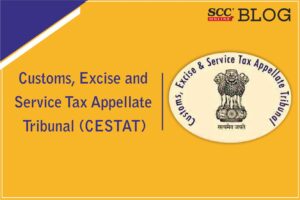Customs, Excise and Service Tax Appellate Tribunal: While dealing with an issue relating to recovery of Modified Value Added Tax (MODVAT) credit charged on ‘welding electrode’, C J Mathew (Technical Member) held that characteristics of ‘consumables’ do not attach to ‘welding electrodes’, therefore, recovery of MODVAT credit ordered by Commissioner of CGST and Central Excise was incorrect.
Facts of the Case
The issue in the present appeal of Manikgarh Cement against the order of Commissioner of CGST and Central Excise (the Commissioner) was the availment of Modified Value Added Tax (MODVAT) credit, under rule 57Q of Central Excise Rules, 1994 (‘Rules’) charged on procurement of ‘welding electrode’ by the Commissioner. The dispute had been carried once before through the appellate hierarchy to the High Court of Bombay before being remanded back to the original authority for ascertaining the manner of use of the ‘welding electrodes’ to qualify as ‘capital goods’. The appellant contended that ‘welding electrodes’ were also found within ‘capital goods’, which were eligible for availment of MODVAT credit.
The Adjudicating Authority had, in accordance with the directions of the High Court of Bombay, scrutinized the usage of the ‘welding electrodes’ in the factory and placing reliance on the circular of the Central Board of Excise and Customs (CBEC) which directed that credit shall not be admissible on ‘input’ used for repair and maintenance of ‘capital goods’, concluded by ordering that recovery of the credit was wrongly taken. In the fresh order, it was recorded that the original authority, after having examined the process of manufacture in detail, had found that the ‘welding electrodes’ were not ‘capital goods’.
Question for Consideration
Whether ‘welding electrodes’ were ‘consumables’ as held by the original authority or were used in the manufacture of excisable goods and, therefore, eligible for MODVAT credit?
Analysis, Law and Decision
1. The legal position is abundantly clear as, in the Explanation in rule 57Q of the Rules, it is enumerated as follows:
‘(1) “capital goods” means-
(a) machines, machinery, plant, equipment, apparatus, tools or appliances used for producing orprocessing of any goods or for bringing about any change in any substance for the manufactureof final products;
(b) components, spare parts and accessories of the aforesaid machines, machinery, plant,equipment, apparatus, tools or appliances used for aforesaid purpose; and
(c) moulds and dies, generating sets and weighbridges used in the factory of the manufacturer.’
2. MODVAT credit was available on procurement of goods that were ‘input’ with ‘capital goods’ being entitled to the extent of conformity with Explanation of that expression in rule 75Q of the Rules. There was no mention of ‘consumables’ in the Explanation but neither was it certain that ‘consumables’ had little to do with manufacturing process for depriving eligibility for MODVAT credit. It was not anybody’s case that ‘consumables’ cease to exist over period of usage, it was merely that replenishment was required to the nature of the product.
3. The common understanding of ‘consumables’ was that of depletion without transfer to the goods deployed for manufacture but there were a few, such as ‘welding electrodes’, which upon such consumption, enhances the capital goods which were, undoubtedly, eligible for credit. Absence of ‘welding electrodes’ for deployment on ‘liners’, which were ‘capital goods’, impedes production and, therefore, their use was essential for production.
The Tribunal held that the proceedings of the original authority, based on the finding that the ‘welding electrodes’ were ‘consumables’, had ignored that the characteristics of ‘consumables’ do not attach to ‘welding electrodes’ and therefore, the consequential recovery of MODVAT credit in the impugned order was incorrect.
[Manikgarh Cement v. Commissioner of Central Excise, Excise Appeal No: 86755 of 2019, decided on 21-10-2022]
Advocates who appeared in this case :
Ms Shamita J Patel, Advocate, for the Appellant(s);
Sanjay Hasija, Advocate, for the Respondent(s).

